Probiotics
Probiotic Benefits: What You Need To Know
Your bowels do much more than just transporting waste that’s flushed away down the toilet pan. They are also home to a staggering 500 million bacteria. Some of these are good for us and some are downright bad. Research suggests that achieving a healthy balance between these is crucial to maintaining optimum health and wellbeing (1). In this article, you’ll learn all about the many probiotic benefits these microorganisms give you!
Probiotics are not some new-fangled discovery. For thousands of years and across continents, societies have survived and thrived on probiotics in foods that have been cultured and fermented to preserve them. Today, our modern lives mean we eat much smaller amounts of fermented food, so we need to give the friendly bacteria a boost to stay fit, feel well and protect our bodies against disease.
Table of Contents
What are probiotics?
Probiotic is another name for the hundreds of different “good bacteria” that line the gut, also known as the microbiome. They act to maintain healthy digestion and break down the fiber in our food, but their influence extends far beyond the bowels.
Probiotics keep the bad bacteria as well as any yeast and fungi under control. They have an important role in helping the body absorb micronutrients, such as vitamins A, D and E, essential minerals like calcium, iron and chromium, and in producing vitamins including B12, folic acid and vitamin K.
They also fight infection, boost your immune system, protect against disease and keep your skin looking lovely. So, you can give both your bowels and your overall health a boost by working probiotics into your daily diet.
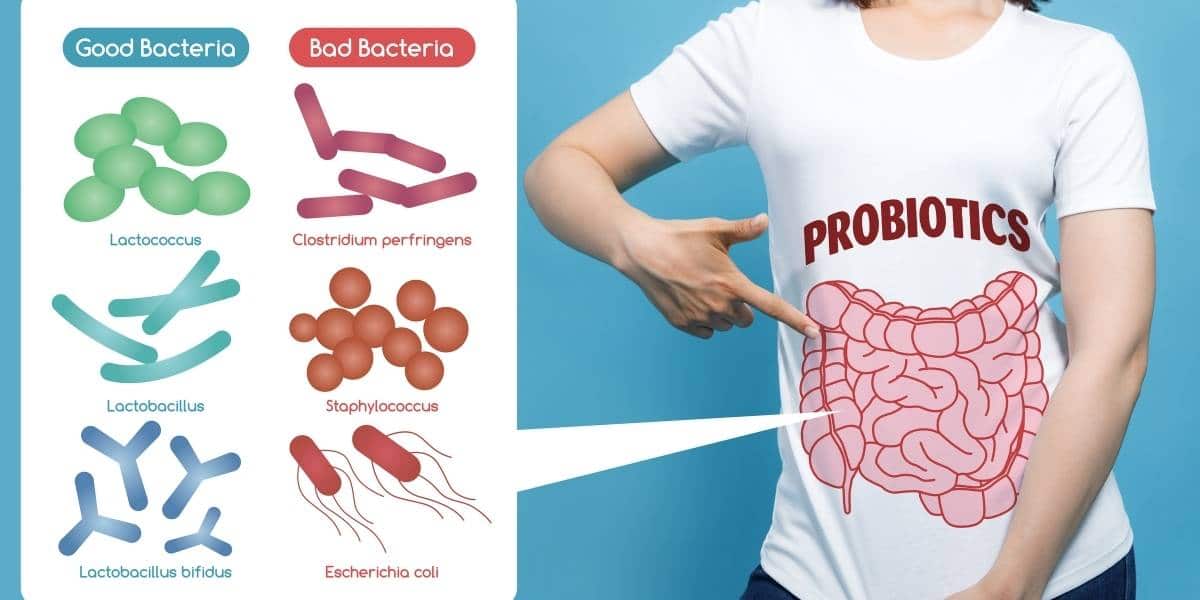
Where do they come from?
From the moment we left the safety of the womb and prepared to enter the world, our microbiome was formed and is an important part of our system (2). They are introduced when we are first exposed to our mother’s bacteria in the birth canal and beyond. And they continue to develop and grow as we breastfeed, take a bottle, and move onto solids. This bacterial colonization of the bowel is thought to have a crucial role in inducing immunity in babies and protecting them in future life.
The right balance
Maintaining a healthy balance between good and bad bacteria is one of the keys to digestive health and much, much more! Gastro-intestinal experts believe that the balance of gut flora should be around 85% good bacteria and only 15% of the bad stuff.
Lower levels of probiotics can make our bowels a giant petri dish, allowing bad bacteria, yeasts, fungal infections, and parasites to grow and multiply. Unfortunately, our modern lifestyles and diets can attack healthy bacteria, leaving our guts depleted and our bodies vulnerable.
Stress, medications, antibiotics in the food chain, too many carbs and dietary grains and even chemicals in the water we drink can all attack the healthy gut flora. To tip the scales back in a healthy direction, we need to cut out the foods that feed bad bacteria and to eat more foods rich in probiotics or start to take supplements regularly.
Is diet enough?
You can get the probiotics your body needs from your diet, but it’s going to take more than just meat and two vegetables. The foods that are rich in healthy bacteria may not appear on your average weekly shopping list.
Refrigeration and better food availability may actually be bad for our bowels. In years gone by, people used fermentation and culturing to preserve food for the lean winter months. These foods were rich in probiotics, so our gut flora would have regularly been given a dietary boost.
Now most of us are desperately in need of a bacterial top-up. Try to add these foods to your diet for a little probiotic punch, or consider a supplement if you find you simply can’t stomach kimchi or sauerkraut.
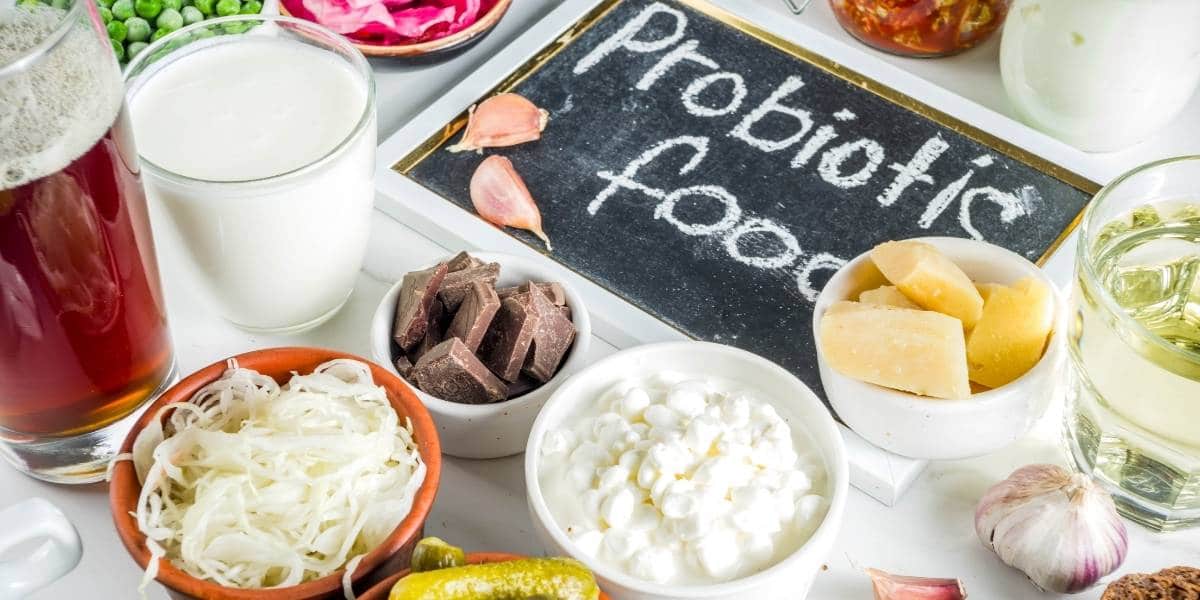
9 Probiotic Superfoods
If you want to get your probiotics from food, then you need to eat more of these 9 ‘superfoods’ to experience probiotic benefits!
Yoghurt
Live-cultured or Greek yogurt is probably the most popular probiotic food in the UK and the USA. It can be a wholesome and delightful way to boost your healthy bacteria. However, the vast selection of brands, flavors and varieties of yogurts on the supermarket shelves can make it tricky to tell a healthy probiotic from a sweet treat.
When picking your yogurt, look for organic products made from the milk of grass-fed goats, sheep or cows. Varieties with higher fat and lower sugar and flavorings tend to be more satisfying and less processed. You can add sweetness and nutrients with fresh fruit, nuts, and honey.
Kefir
Kefir is a fermented dairy product, a little like yogurt. The name means ‘feeling good’ and this tart, creamy concoction contains as many as thirty-four probiotic strains. All of the lactose in the milk has been broken down during the production process, so kefir can be enjoyed by people who are lactose intolerant too.
Sauerkraut
A German national dish made from fermented cabbage and other veggies. Sauerkraut is rich in natural lactic acid bacteria such as lactobacillus. It also contains lots of organic acids, which support the growth of good bacteria, so there’s double the probiotic benefit!
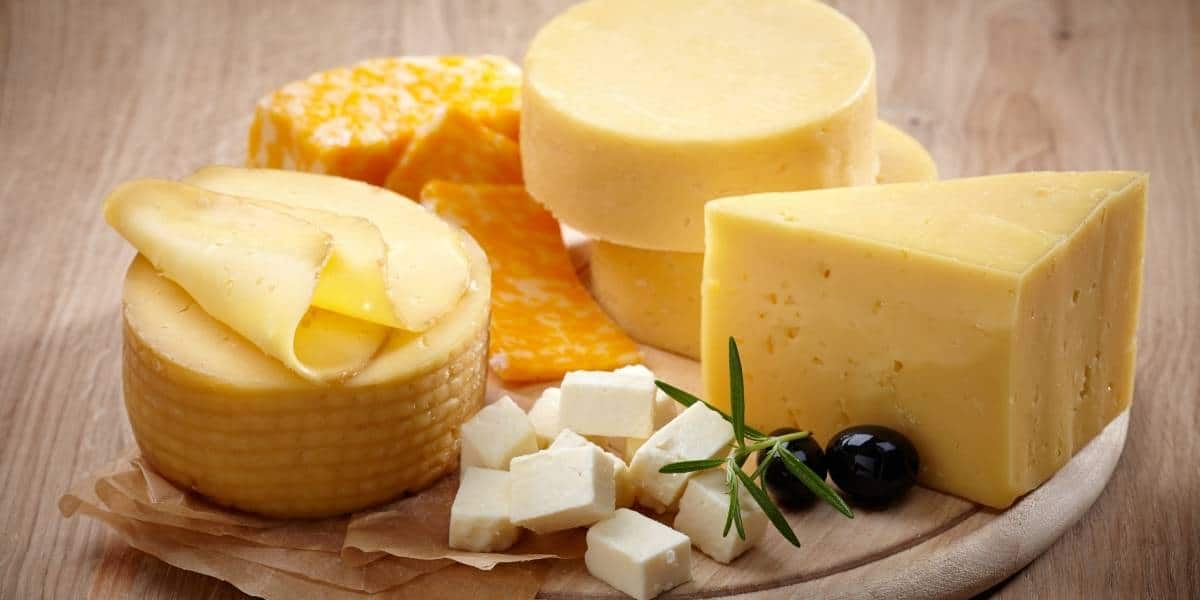
Raw Cheese
Quality cheeses made from raw, unpasteurized milk from cows (ideally A2), goats and sheep are high in a number of probiotics. Their high fat level and low acidity protects the bacteria as they pass through the GI tract. Cheddar, feta, Gouda, Edam, Emmental and Gruyere can all be good examples. However it’s important to pick produce that is labeled organic and unpasteurized. Make sure you stay away from these if you are pregnant or immunosuppressed, as it could put you at risk of listeria (a bacterium) infection.
Kimchi
Kimchi is sauerkraut’s cultured Korean cousin. It is made with Chinese cabbage combined with other vegetables and spices like garlic, onions, ginger and radishes. The mixture is seasoned with sea salt and fish sauce and left to ferment for as long as two weeks before it’s ready to store or enjoy.
Coconut Kefir
Fermented coconut juice can make a delicious, dairy-free kefir. It isn’t quite as rich in healthy bacteria as the traditional version but it can be a great alternative. It also makes a refreshing drink with a little honey and lime juice.
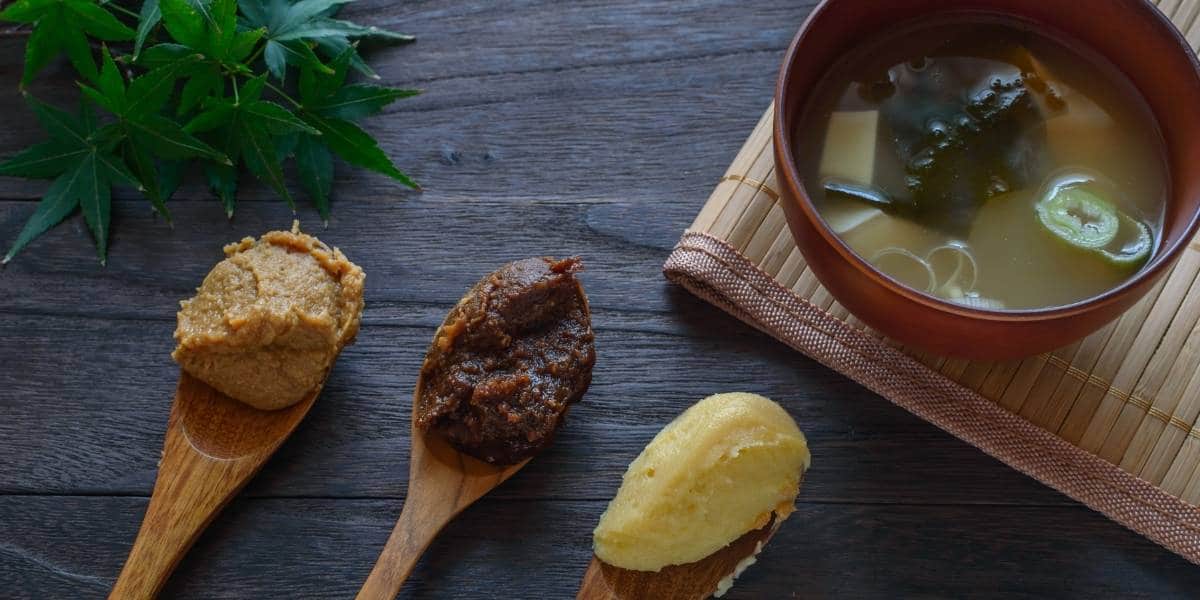
Miso
Miso has been an important part of Chinese and Japanese diets since the year 0. It is made from fermented soybeans together with a grain like rice or barley and then made into a dark, buttery paste. When mixed with some boiled water and noodles, veggies or seaweed to your taste it makes a low-calorie, intensely savory soup that satisfies, stimulates digestion and tops up those probiotics. Small wonder that most Japanese people enjoy miso for breakfast every day.
Natto
Natto is another popular Japanese dish harnessing the probiotics from fermented soybeans. Natto contains a powerful probiotic, Bacillus subtilis, which boosts the immune system and seems to protect against cardiovascular disease (3).
Ginger beer
If those foods all seem to be too much of an acquired taste for your liking then you can get your probiotic boost the same way as the Famous Five did, with lashings of ginger beer. But to get the probiotic benefit it’s no good swilling the stuff from a can, you’ll need to make your own. It’s a little work but the results are definitely worth it for your palate and your health (4).
Because of the problems with getting enough of the healthy bacteria we need in our modern diets, many fortified yogurt drinks and supplements are available as a no-hassle way of keeping the friendly flora topped up and helping us harness the many probiotic benefits (5).

9+ Probiotic Benefits
Probiotic benefits in the bowel
The secret to restoring and maintaining the health of your gastrointestinal system may be all about balancing your gut bacteria. Researchers have investigated the effects of probiotics on a number of digestive disorders and noticed significant probiotic benefits.
Probiotics can kill or decrease the growth of harmful bacteria in the bowel, preventing them from releasing toxic chemicals that can make you unwell. This can help prevent and treat diarrhea caused by antibiotics, including the life-threatening superbug C. difficile (6) as well as fighting infectious diarrhea (7). Supplements may also ease the flatulence, pain and discomfort of irritable bowel syndrome (8).
Many people have found a significant probiotic benefit in the management of the inflammatory bowel diseases Crohn’s and Ulcerative Colitis. The evidence here is less clear-cut and more research is necessary. However, studies do confirm that if a part of the bowel has been removed, resulting in unpleasant inflammation in the leftover pouch, probiotic-enriched drinks can soothe symptoms and provide welcome relief (9).
Probiotics for the immune system
As well as fighting the superbug C. difficile, probiotics stimulate the secretion of immune-enhancing IgA (immuno globulin A) which is an antibody that plays a critical role in immune function in the mucous membranes. It also stimulates secretion of T Cells (white blood cells).
A 2014 study in the Journal of Science and Medicine in Sport, found that athletes who supplemented with probiotics suffered 40% fewer colds and gastrointestinal infections (10).
Also, a 2014 meta analysis study in the British Journal of Nutrition that reviewed 20 clinical studies looking at the effect of probiotics on immunity found the following:
the average duration of respiratory illness episodes, the number of days of illness per person, and the number of days absent from day care/work/school were significantly reduced with probiotic treatment compared with placebo (11).

Probiotics for lactose intolerance
If you’re unable to digest lactose, the sugar found in dairy produce, you may get relief from probiotics and, in particular, from Lactobacillus acidophilus. Supplements may help ease stomach cramps, flatulence and diarrhea. So cut out dairy and add in a probiotic supplement or some kefir to boost the levels of good bacteria (12).
Probiotics for your skin
Probiotics in the gut can create a barrier that reduces inflammation, which is a key trigger to some skin conditions. Taken orally, or sometimes applied topically, the healthy bacteria improved symptoms in acne, rosacea and eczema. Early studies suggest that it may even help to hold back the ravage of time and improve fine lines and wrinkles (13).
Fighting allergies and eczema
Some babies are born atopic. It’s an allergic tendency that runs in families making them more prone to eczema, hay-fever and asthma. But there may be a way of preventing and protecting against symptoms. There is some research evidence that early use of probiotics in babies may help protect young children from allergies and particularly eczema in the early years (14). Check out our Kid’s Probiotics with Prebiotics supplement, it may you out!
Protecting the premature
There is good research evidence that probiotics can help protect babies who are born too soon. Some very low birth weight infants are at risk of a condition called necrotizing enterocolitis, in which the bowel becomes inflamed and starts to die. A review of the studies confirmed that probiotics can prevent necrotizing enterocolitis and death in vulnerable babies under 1.5kg (15).
Healthy teeth and gums
Are you paranoid about bad breath? Well, instead of popping mints you may be better off taking some friendly bacteria. Evidence is mounting to suggest that probiotics could be useful in preventing and treating oral infections, including dental cavities, gum disease and halitosis (16).
Combating the common cold
Streaming nose, tickly cough and feeling generally rough and grumpy, we’re all too familiar with the common cold. A cold isn’t dangerous or debilitating but it can be downright miserable. Early studies looking at probiotic benefits suggested that they may have an effect on preventing a cold from getting a grip, so worth considering as part of your winter anti-viral armory (17).
And there’s even more probiotic benefits…
The impact of probiotic benefits may well extend even further. New studies are looking at the effect of probiotics on treating liver disease, managing autism, preventing kidney stones, fighting stomach ulcers, combating infant colic, battling cancer and new groundbreaking research may indicate that managing our gut flora may even help us lose weight. Moreover, there is also evidence that probiotic benefits may extend to treating urinary tract infections that commonly occur in women.
An imbalance in the gut bacteria has also been shown to have an effect on mental health conditions such as depression and anxiety. In fact, 95% of the body’s serotonin is produced by our good gut bacteria.
We are on the brink of discovering the true importance of balancing the bacteria in our bowels. The evidence suggests that we should be eating probiotic rich foods or taking supplements every day. By making this small change we can help ourselves stay well, fight disease and maintain our wellbeing.
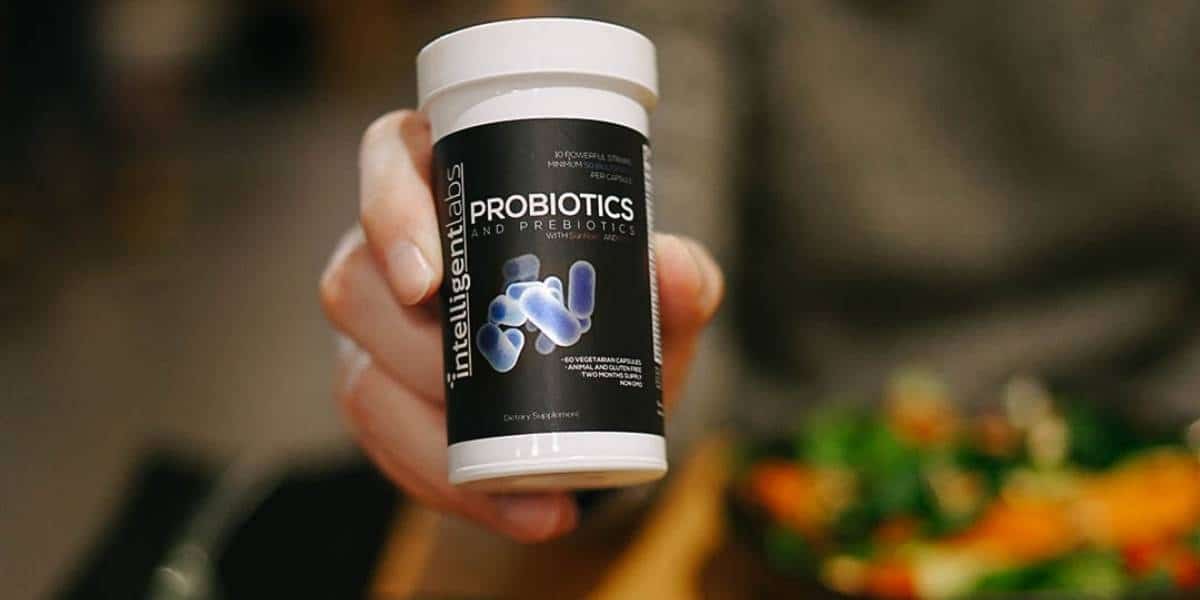
The right supplement
A probiotic is not a single thing; there are literally hundreds of different strains of bacteria and they each have different functions and health benefits. Some probiotics support the immune system. Others act to manufacture or absorb micronutrients or to improve digestion.
If you want to target a specific health concern, it’s important to use the right probiotic for the job in hand. Alternatively, select a broad-spectrum supplement rich in a variety of probiotics for maximum benefit (18).
Here are a few pointers to help you choose the right probiotic supplement:
- Supplementation can be tricky because the acid in your stomach can blitz the contents before they get to work. Choose a reputable brand that uses heat, acid, and bile-resistant strains.
- Choose a product with a high number of colony-forming units (CFUs) of between 15 billion and 100 billion and a diverse number of strains.
- Also more important than capsule strength is that the probiotic company is using properly researched sub-strains, simply listing a strain is not good enough. For example, we use Lactobacillus acidophilus LA-15 in our probiotics. It is a specific sub-strain of Lactobacillus acidophilus that we have chosen for its specific health benefits and its ability to survive stomach acid and bile. Many probiotic companies simply use cheap generic un-researched sub-strains. You can think of it a little bit like a dog, there are many different dog breeds all with their differing characteristics.
- Probiotics can be damaged and deactivated in heat, so ensure that you keep your supplements cool and choose a supplier that looks after their products carefully.
Are probiotic supplements safe?
When you first start taking a supplement or upping your probiotics you may notice you develop an upset tummy and diarrhea, especially if you go too hard too soon. So take it easy, start with just one tablet, or a little kefir and gradually increase as your gut gets used to the new little residents.
Probiotic supplements have been shown to be safe in the overwhelming majority of cases. However, for people who are severely unwell or immunosuppressed, they should be used with a little more caution. So if that’s you, see your doctor for advice (19).
What should I do?
To achieve optimum health, try to ban things that destroy probiotics, like sugar, grains, unnecessary antibiotic courses, and emotional stresses from your life. Aim to eat organic produce, pick some of the superfoods from our list daily and take a good supplement every day (preferably, take it with food). Soon your bowels and your body will be healthier as a result.
Want more info on probiotics? Check our probiotics ultimate guide here if you’d like to know more how these beneficial bacteria work.
💬 Something on your mind? Share your thoughts in the comments. We love hearing from curious minds.
📩 And while you’re here, join our newsletter for more smart stuff (and secret perks)!
References:
1) Role of Probiotics in health improvement, infection control and disease treatment and management (Saudi Pharmaceutical Journal Volume 23, Issue 2, April 2015, Pages 107–114) A.A. Amaraa, A. Shiblb
2) Early bacterial colonisation of the intestine: why it matters (ITAL J PEDIATR 2005;31:360-369) J.P. LANGHENDRIES
3) Vitamin K supplementation and progression of coronary artery calcium in older men and women (Am J Clin Nutr. 2009 Jun;89(6):1799-807) Shea MK1, O’Donnell CJ, Hoffmann U, Dallal GE, Dawson-Hughes B, Ordovas JM, Price PA, Williamson MK, Booth SL.
4) How to make real ginger beer (The Guardian) John Wright
http://www.theguardian.com/lifeandstyle/wordofmouth/2011/jun/29/how-make-real-ginger-beer
5) Foods Fortified With Prebiotics and Probiotics Expected To Grow As Research Continues On Gut Health Mark Anthony, Ph.D.
6) The use of probiotics to prevent c. difficile diarrhea (Cochrane Collaboration 2013) Goldenberg JZ, Ma SSY, Saxton JD, Martzen MR, Vandvik PO, Thorlund K, Guyatt GH, Johnston BC
7) Probiotics for treating acute infectious diarrhoea (Cochrane Collaboration 2010) Allen SJ, Martinez EG, Gregorio GV, Dans LF
8) The efficacy of probiotics in the treatment of irritable bowel syndrome: a systematic review (Gut. 2010 Mar;59(3):325-32) Moayyedi P1, Ford AC, Talley NJ, Cremonini F, Foxx-Orenstein AE, Brandt LJ, Quigley EM.
9) Therapy for treatment and prevention of pouchitis (Cochrane Collaboration, 2015) Singh S, Stroud AM, Holubar SD, Sandborn WJ, Pardi D
10) Probiotic supplementation reduces the duration and incidence of infections but not severity in elite rugby union players. Journal of Science and Medicine in Sport , Volume 17 , Issue 4 , 356 – 360. Haywood, Brylee A. et al. (2012)
11) Effectiveness of probiotics on the duration of illness in healthy children and adults who develop common acute respiratory infectious conditions: a systematic review and meta-analysis. British Journal of Nutrition. July 2014; 112(1): 41–54. Sarah King et al (2014)
12) http://www.nhs.uk/Conditions/probiotics/Pages/Introduction.aspx#lactose
13) http://www.livescience.com/46502-probiotics-hold-promise-skin-conditions.html
14) Probiotics and prebiotics in preventing food allergy and eczema (Curr Opin Allergy Clin Immunol 2013 Jun;13(3):280-6) Kuitunen M
15) Probiotics and necrotizing enterocolitis in preterm infants (Cochrane Collaboration 2014) AlFaleh K, Anabrees J
16) Probiotics for Oral Health: Myth or Reality? (Canadian Dental Association report) Laetitia Bonifait, DEA; Fatiha Chandad, PhD; Daniel Grenier, PhD
17) The Effect of Probiotics on Prevention of Common Cold: A Meta-Analysis of Randomized Controlled Trial Studies (Korean J Fam Med. 2013 Jan; 34(1): 2–10) En-Jin Kang, Soo Young Kim, In-Hong Hwang, and Yun-Jeong Ji
18) Probiotic use in clinical practice: what are the risks? (2006 American Society for Clinical Nutrition) Robert J Boyle, Roy M Robins-Browne, and Mimi LK Tang
19) Probiotics: Properties, Examples, and Specific Applications (Perspectives in Medicine 2013) Judith Behnsen, Elisa Deriu, Martina Sassone-Corsi and Manuela Raffatellu





